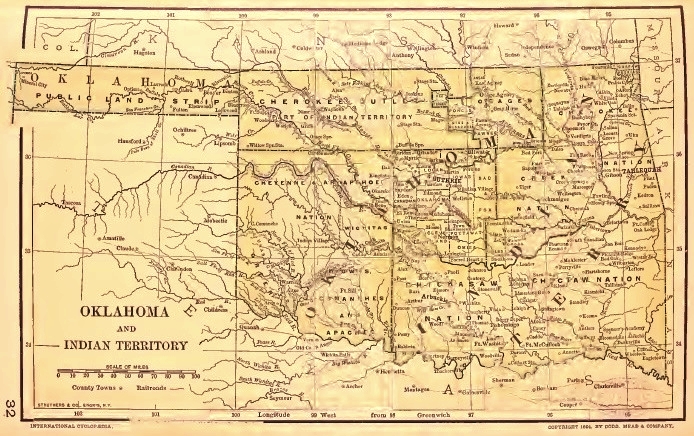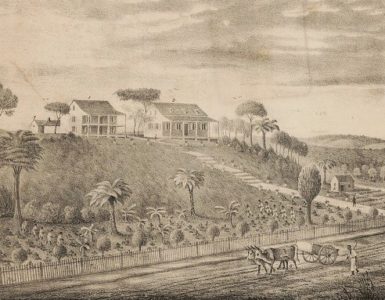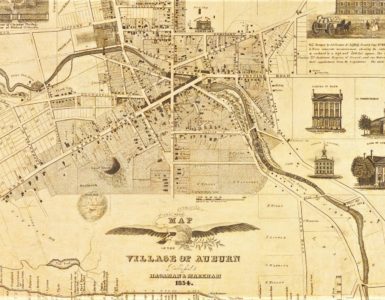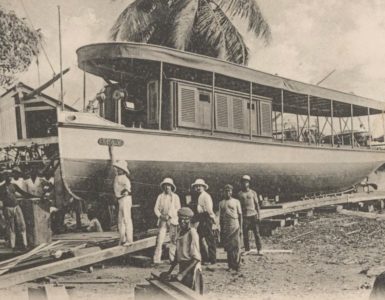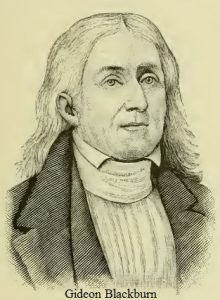 From the earliest days of the Presbyterian Church in Colonial America there was evangelistic work by ministers among their Indian neighbors. Through the formation of Philadelphia Presbytery, 1706, then the organization of presbyteries into the Synod of Philadelphia, 1717, and finally the consolidation of synods into the General Assembly of the Presbyterian Church in the United States of America (PCUSA), 1789, there were ministers that worked with American Indians. The first missionary specifically appointed for this ministry by the PCUSA was Gideon Blackburn in 1803. Blackburn was an appropriate choice for work among the Cherokees in rugged eastern Tennessee because of his frontiersman qualities; he was as at home in the forest hunting and tracking as when standing behind the pulpit, Bible in hand, with his musket at his side. Blackburn not only provided pastoral ministry but schools for the Cherokee children. He continued his missions work in Tennessee until 1811.
From the earliest days of the Presbyterian Church in Colonial America there was evangelistic work by ministers among their Indian neighbors. Through the formation of Philadelphia Presbytery, 1706, then the organization of presbyteries into the Synod of Philadelphia, 1717, and finally the consolidation of synods into the General Assembly of the Presbyterian Church in the United States of America (PCUSA), 1789, there were ministers that worked with American Indians. The first missionary specifically appointed for this ministry by the PCUSA was Gideon Blackburn in 1803. Blackburn was an appropriate choice for work among the Cherokees in rugged eastern Tennessee because of his frontiersman qualities; he was as at home in the forest hunting and tracking as when standing behind the pulpit, Bible in hand, with his musket at his side. Blackburn not only provided pastoral ministry but schools for the Cherokee children. He continued his missions work in Tennessee until 1811.
Following the Civil War, both the PCUSA and the Presbyterian Church in the United States (PCUS) operated missions in the Indian Territory. In 1830, the territory was established in the eastern part of what is currently Oklahoma in conjunction with the Indian Removal Act. Included among the tribes removed from their land east of the Mississippi River were the Cherokees. The journey west received the name “The Trail of Tears” due to the hardships of the trek that resulted in many deaths. Included with the Cherokees were Creeks, Choctaws, Chickasaws, and Seminoles. As the years passed, others, such as the Apaches, were moved onto their respective reservations within the territory. The PCUS, which had churches predominantly in the South, had experienced difficulties and setbacks with its Indian Territory missions from about 1865 into the 1880s. By the time young Joshua Bohannon completed his educational program and was ordained to the ministry, the PCUS had determined that the best solution to its missionary difficulties with the peoples on the reservations was with Indian ministers. E. T. Thompson notes that by 1889, the PCUS had thirteen missionaries including ten American Indian ministers serving twenty-two churches, but four of the Native ministers with 332 congregants left the PCUS to unite with the mission of the PCUSA that same year.
It can be seen from the birth and death dates in the title of this biography that Joshua Bohannon lived a short life, which unfortunately means there is only enough information to provide a facts and figures biography mixed with some speculation. He was born in 1864 in the Choctaw Nation but his parents are not named in his entry in Scott’s Ministerial Directory of the PCUS. It is possible that he was abandoned when a child and his Bohannon surname was assigned to him by an orphanage, or he may have been adopted by Bohannons. It is likely he attended one of the academies on his reservation that was operated by missionaries. His college education was accomplished in two Presbyterian Church institutions beginning with Arkansas College in Batesville, 1885-1887, and then Southwestern Presbyterian University, 1887-1890, which was at the time in Clarksville, Tennessee. He remained at Southwestern for his theological education. The Divinity School at Southwestern Presbyterian University began in 1885. It included among its faculty over the years James A. Lyon, Jr., R. A. Webb, Thornton Whaling, and W. A. Alexander. The divinity school continued until its program was suspended in June 1917. Given that The Great War began for Americans in April of that year, it is possible diminishing attendance was dealt a death blow by the Doughboys abandoning their educations to go “Over There” and serve their country.
For about a year during his seminary studies he was a student missionary to the Choctaws and Chickasaws. Upon completion of his program at Southwestern he was licensed by Nashville Presbytery and then ordained by the Indian Presbytery, July 2, 1893, to pastor churches in Bennington and Durant, Choctaw Nation. After all his preparation, he served his call for only six months dying in Durant on December 22, 1893.
A friend of Joshua’s from his days at Southwestern published an obituary in The Southwestern Presbyterian newspaper, January 11, 1894. The remembrance was signed “H.J.C.” which was likely Henry Joseph Compton (1851-1918) who was a minister in McComb, Mississippi.
In the death of this young soldier of the Cross, we are again brought to a realization of the fact that God’s ways are not our ways. Strange and sad as it may seem, that one in the bloom of youth, scarcely yet thirty years of age, and having but entered upon his life’s work, after spending seven years in preparing himself to preach the glories of his Master’s kingdom, should be thus suddenly taken away. His one hope and ambition was to preach the Gospel to his own people, but his ministry was of less than six months’ duration. His course was run, and the Master called him home to receive his crown….
Bro. Bohannon was loved and honored by all with whom he associated. He was a diligent and faithful student, a consecrated, conscientious Christian–in short, all that may be expected of a true Christian gentleman. His was of a noble disposition, not easily provoked to anger or impatience. The writer, having roomed with him for two years, never once saw his tranquil temper disturbed.
He had consecrated his life to the Master’s service; and often said if it were not for the great need in his own Territory, and his adaptability to that work, he would unhesitatingly go to the Foreign field.
His life was full of promise, and he looked forward with joy to winning many souls to the Savior. He had just completed a home, but the Lord called him to the place prepared for him in the Father’s house. Had he lived, no doubt but that he would have won many precious souls; but his death may be the means of leading many prodigals back to the Father’s house. “No man dieth unto himself.” “He rests from his labors and his works do follow him.”
In the death of Bro. Bohannon, the Church has lost a valiant soldier. Who will rise up to take his place?
By this act of Providence, there are hearts that ache, hopes that are blighted, spirits that are crushed. May the comforts of the Gospel of “the Man of Sorrows, who was acquainted with grief,” be their portion in this dark hour of trial! “Blessed are they that mourn, for they shall be comforted.”
It was not the usual practice of the PCUS General Assembly to publish memorials in its minutes for minsters that died, but Rev. Joshua Bohannon was remembered with a brief paragraph in the 1894 edition. As Bohannon’s memorialist noted in his heart-felt words in The Southwestern Presbyterian, God’s ways are not our ways. The Westminster Shorter Catechism in its answer to Question 11 says that “God’s works of providence are his most holy, wise and powerful preserving and governing all his creatures, and all their actions,” but in the case of young Bohannon who had followed his long road of preparation for ministry with cross-cultural challenges, more years of pastoral service would have made sense, humanly speaking. But, then, maybe Rev. Bohannon’s relocation to his eternal home was a reward for a well-lived but brief life of service to his Lord.
Barry Waugh
Notes—The portrait of Gideon Blackburn is from Nevin’s Presbyterian Encyclopedia. The information on Southwestern is from W. R. Cooper, Southwestern at Memphis, 1848-1948, Richmond: John Knox, Press, 1949, and from some catalogs of the university available online. The pages consulted in E. T. Thompson’s third volume of Presbyterians in the South were 71-77. The memorial for Bohannon from The Southwestern Presbyterian was provided by the PCA Historical Center, Wayne Sparkman, Director. The United States Congress admitted Oklahoma the sixteenth state on November 16, 1907. A Portrait of Joshua Bohannon could not be located. The map of the Indian Territory and abutting states is from, The Universal Atlas Including County and Railroad Maps of the United States Together with Carefully Prepared Maps of all other Countries from Latest Surveys, New York: Dodd, Mead and Co., 1892. Note that other spellings for Bohannon include, Bohannan, Bohanon, and Bohanan. To read biographies of other missionaries to American Indians on Presbyterians of the Past, go to the posts about Thomas S. Williamson (1800-1879), and John Ross (1783-1876). See the article on this site, “What are the Old School & New School?” for an explanation of the terms.


